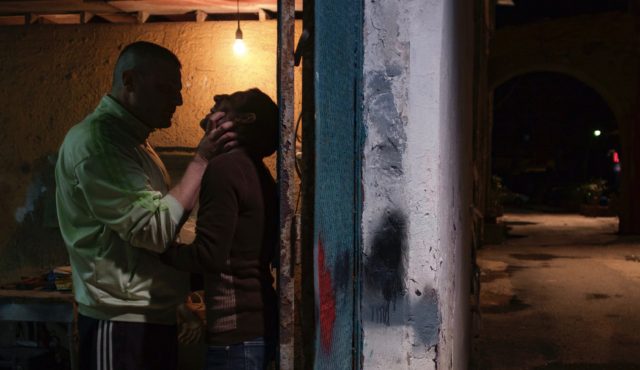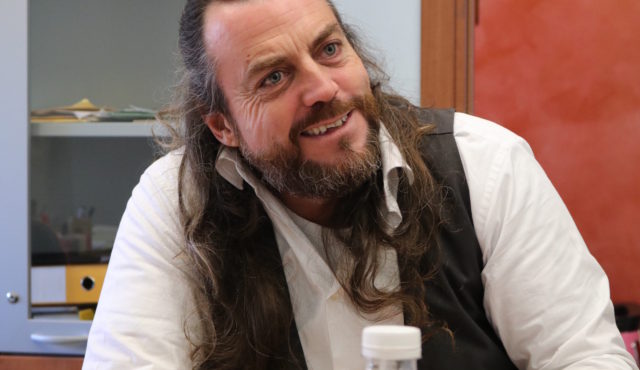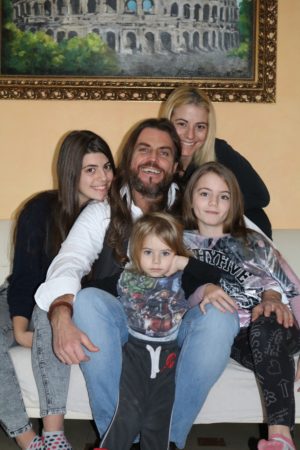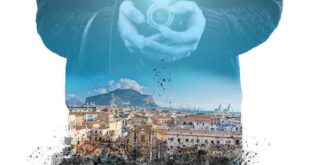Matteo Garrone’s “Dogman” opened at the 2018 Cannes Film Festival where the lead actor, Marcello Fonte took home the top acting prize. Since then, it’s won numerous awards including the Italian Oscar Best Supporting Actor.
The film follows Marcello (Marcello Fonte), an animal lover who runs a neighborhood dog grooming business. He adores his pre-teen daughter and takes her on scuba diving expeditions. The two dream of going to exotic places like the Red Sea, Hawaii and the Maldives. Marcello also has a frailty about him and sometimes seems to feel inferior. He doesn’t speak up on his own behalf and people take advantage of him, especially the local bully, Simone (Edoardo Pesce). Marcello goes along with Simone’s antics and even saves his life after he was hit during a drive by shooting. However, things start spiraling out of control and Simone makes a demand that Marcello strongly opposes. After Simone roughs him up and makes it clear that he won’t take no for an answer, Marcello caves and ends up taking the fall for Simone. When he finishes doing time for the crime he didn’t commit, he finds himself a changed man. Prison opened his eyes and he no longer tolerates being bullied. Simone, more evil than ever, doesn’t acknowledge what Marcello did for him and blows him off. That was Marcello’s last straw and he vows to get revenge. But even after he does, his life will never be the same as it was before.
With the recent popularity of films and television series like Gomorra and Suburra, there has been an increase in Italian films with topics of organized crime. From watching the clips of Dogman, some may think this is another one of those films but nothing could be farther from the truth. Through the eyes of his lead character, Marcello, Garrone empathetically presents his audience with the hopes and shattered dreams of a simple man and a father. Marcello is a beautiful character filled with love and flaws, a man who is trying to do the right thing as he is surrounded by corruption. His nature is to agree even when he knows that he should stand up and disagree and he ultimately pays the price.
The actors in Garrone’s cast are newcomers to most Americans but they’ve been character actors in Italian cinema for many years. One actor who has a small but pivotal role in “Dogman” is Mirko Frezza, whose character is also named “Mirko.” In just three years after making his feature film debut, he has become a familiar face to Italians. We spoke with him at his community outreach center on the outskirts of Rome shortly after the premiere of his breakout role opposite Alessandro Borghi in Michele Vannucci’s 2016 “Il piu grande sogno” (The Greatest Dream).
Frezza had a rough start in life. He originally wanted to become a police officer, but his family history of run-ins with the law kept that from happening. He got by with a number of jobs, some shady, some not. A few years ago, his life took a turn when he decided to pursue acting. But it should be made clear that Frezza is not interested in being an actor who works non-stop. He is more interested in portraying characters with stories he believes in; stories of humanity, honor, family and truth.
Aside from acting, one of his life’s passions is to help the less fortunate. In his community of La Rustica, there is no shortage of people that benefit from that help. There, Frezza started somewhat of a soup kitchen to feed the poor people of his community. It also serves as a recreation area where people congregate with friends and family.
We met Frezza at this recreation center, which was also the main location of his debut film, a story based loosely on his life. It was just after Christmas and he showed us where the holiday dinners took place and where people congregate. He explained to us how great it feels to be able to help these people and how much still needs to be done. A number of the people who frequent his center are refugees, whose stories have been front and center in Europe’s ongoing issues of clandestine immigrants, and specifically the problems with their assimilation into Roman society. “It’s fine to be multi-racial. That’s what you want. We want to become like London.. yellow, red, green, black.. people of all races together. We are fine with it and we have tolerated a lot. Seventy to eighty percent of Italians have no interest in skin color, but unfortunately there are some that use skin color as an excuse to complain,” he explained. Frezza feels that even though the majority of Italians are okay with immigration in Italy, there is still a lot of ignorance. People need to stop and think about the plight of these people.
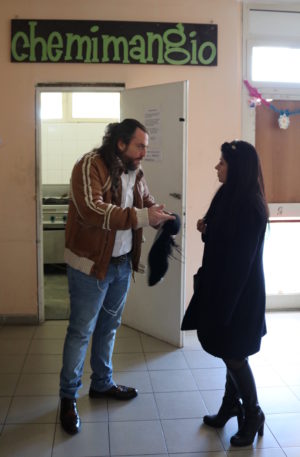 Frezza began his acting career in his 40’s although you’d never know it by watching him on screen. His costar in “Il più grande sogno,” Alessandro Borghi, had a big part in pushing him to audition. He had first auditioned for a short film that director Michele Vannucci was making at Rome’s famed film school Centro Sperimentale di Cinematografia. That role didn’t work out but Vannucci never forgot Frezza’s unique face or his compelling story. So when Vannucci was ready to make his first feature-length film, he went straight to Frezza and the two collaborated.
Frezza began his acting career in his 40’s although you’d never know it by watching him on screen. His costar in “Il più grande sogno,” Alessandro Borghi, had a big part in pushing him to audition. He had first auditioned for a short film that director Michele Vannucci was making at Rome’s famed film school Centro Sperimentale di Cinematografia. That role didn’t work out but Vannucci never forgot Frezza’s unique face or his compelling story. So when Vannucci was ready to make his first feature-length film, he went straight to Frezza and the two collaborated.
A poignant moment in our conversation came when Frezza opened up about his family and how his beginnings made him want many children. He had made a reference to the Cinepanettone genre of Italian cinema and I asked him if he enjoys the films of this genre. “I like them because they make the whole family stay together. There are Christian De Sica and Massimo Boldi, the kings of Cinepanettone. It’s a moment in which you can gather all your children and watch these films, explaining all the crazy situations in which the characters find themselves.”
(Fra Noi) So family is important to you. You seem to be a person who centers himself around the family.
“Yes, that’s true because I don’t want to miss out on it. For eight years now, I’ve been putting up a tree for Christmas. Before I had a family of my own, it was just my mother and me or I was alone. But I like having a Christmas tree and celebrating the holidays, decorating the tree with the family. Today, I have three kids for this reason. And also because I passionately love my wife to the point that when she looks at me, I can’t say no! I like a big family. I have to be careful. Otherwise, I’d have 10 kids. That way, there’d always be family around. It’s important.”
Frezza had love in his eyes when he talked about his wife and children. He asked us if we wanted to head over to his house for coffee and to meet them. Of course, we said yes. When we arrived, we understood why he glows when he talks about them. He and his wife have two daughters and son. Their youngest daughter played his daughter in the film, so it was very sweet to see their love and closeness in real-life. It was great to see the family’s close bond and it made us understand why Frezza is so focused on doing good in the community. When you have such a strong, loving foundation at home, there’s nothing but love to spread throughout the world.
 Fra Noi Embrace Your Inner Italian
Fra Noi Embrace Your Inner Italian


